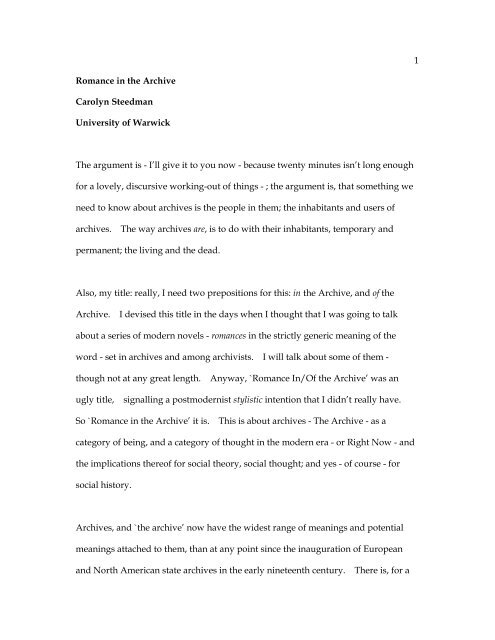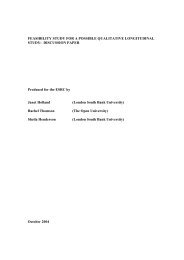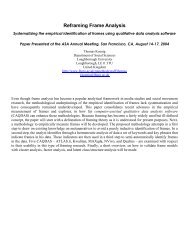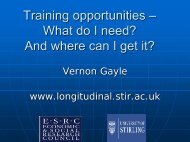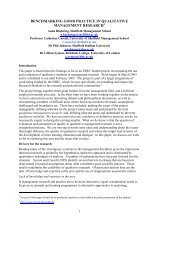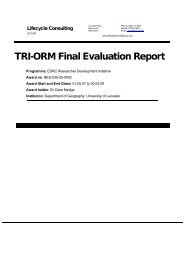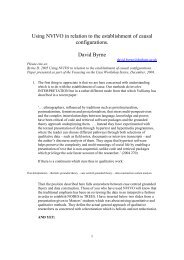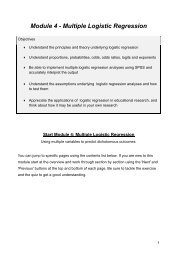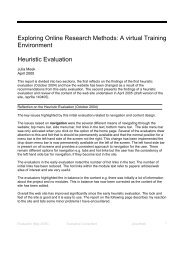1 Romance in the Archive Carolyn Steedman University of Warwick ...
1 Romance in the Archive Carolyn Steedman University of Warwick ...
1 Romance in the Archive Carolyn Steedman University of Warwick ...
You also want an ePaper? Increase the reach of your titles
YUMPU automatically turns print PDFs into web optimized ePapers that Google loves.
1<br />
<strong>Romance</strong> <strong>in</strong> <strong>the</strong> <strong>Archive</strong><br />
<strong>Carolyn</strong> <strong>Steedman</strong><br />
<strong>University</strong> <strong>of</strong> <strong>Warwick</strong><br />
The argument is - I’ll give it to you now - because twenty m<strong>in</strong>utes isn’t long enough<br />
for a lovely, discursive work<strong>in</strong>g-out <strong>of</strong> th<strong>in</strong>gs - ; <strong>the</strong> argument is, that someth<strong>in</strong>g we<br />
need to know about archives is <strong>the</strong> people <strong>in</strong> <strong>the</strong>m; <strong>the</strong> <strong>in</strong>habitants and users <strong>of</strong><br />
archives.<br />
The way archives are, is to do with <strong>the</strong>ir <strong>in</strong>habitants, temporary and<br />
permanent; <strong>the</strong> liv<strong>in</strong>g and <strong>the</strong> dead.<br />
Also, my title: really, I need two prepositions for this: <strong>in</strong> <strong>the</strong> <strong>Archive</strong>, and <strong>of</strong> <strong>the</strong><br />
<strong>Archive</strong>.<br />
I devised this title <strong>in</strong> <strong>the</strong> days when I thought that I was go<strong>in</strong>g to talk<br />
about a series <strong>of</strong> modern novels - romances <strong>in</strong> <strong>the</strong> strictly generic mean<strong>in</strong>g <strong>of</strong> <strong>the</strong><br />
word - set <strong>in</strong> archives and among archivists. I will talk about some <strong>of</strong> <strong>the</strong>m -<br />
though not at any great length.<br />
Anyway, `<strong>Romance</strong> In/Of <strong>the</strong> <strong>Archive</strong>’ was an<br />
ugly title,<br />
signall<strong>in</strong>g a postmodernist stylistic <strong>in</strong>tention that I didn’t really have.<br />
So `<strong>Romance</strong> <strong>in</strong> <strong>the</strong> <strong>Archive</strong>’ it is.<br />
This is about archives - The <strong>Archive</strong> - as a<br />
category <strong>of</strong> be<strong>in</strong>g, and a category <strong>of</strong> thought <strong>in</strong> <strong>the</strong> modern era - or Right Now - and<br />
<strong>the</strong> implications <strong>the</strong>re<strong>of</strong> for social <strong>the</strong>ory, social thought; and yes - <strong>of</strong> course - for<br />
social history.<br />
<strong>Archive</strong>s, and `<strong>the</strong> archive’ now have <strong>the</strong> widest range <strong>of</strong> mean<strong>in</strong>gs and potential<br />
mean<strong>in</strong>gs attached to <strong>the</strong>m, than at any po<strong>in</strong>t s<strong>in</strong>ce <strong>the</strong> <strong>in</strong>auguration <strong>of</strong> European<br />
and North American state archives <strong>in</strong> <strong>the</strong> early n<strong>in</strong>eteenth century.<br />
There is, for a
2<br />
start, Jacques Derrida’s compell<strong>in</strong>g philosophy <strong>of</strong> <strong>the</strong> archive <strong>in</strong> Mal d’archive (1995)<br />
<strong>in</strong> which <strong>the</strong> arke <strong>of</strong> <strong>the</strong> Greek city state is named as <strong>the</strong> place where th<strong>in</strong>gs beg<strong>in</strong>,<br />
where power orig<strong>in</strong>ates, with power’s work<strong>in</strong>gs <strong>in</strong>extricably and for all time, bound<br />
up with <strong>the</strong> authority <strong>of</strong> beg<strong>in</strong>n<strong>in</strong>gs, orig<strong>in</strong>s, and start<strong>in</strong>g po<strong>in</strong>ts.<br />
Those who make<br />
<strong>the</strong>ir way through <strong>Archive</strong> Fever will discover how very much <strong>the</strong> modern allure <strong>of</strong><br />
<strong>the</strong> archive is to do with a Freudian romance, <strong>of</strong> f<strong>in</strong>d<strong>in</strong>g all <strong>the</strong> lost th<strong>in</strong>gs and names,<br />
whatever <strong>the</strong>y may be: th<strong>in</strong>gs gone astray, mislaid, forgotten, wasted.<br />
They will<br />
also discover a very great deal about what <strong>the</strong>y are do<strong>in</strong>g, when <strong>the</strong>y sit down with<br />
pencil <strong>in</strong> hand (always, always, a pencil! never a pen!) before <strong>the</strong> first folder <strong>of</strong><br />
documents called up to <strong>the</strong> British Library Manuscript Read<strong>in</strong>g Room, or <strong>in</strong> <strong>the</strong><br />
uneasy graciousness <strong>of</strong> <strong>the</strong> space set aside for you <strong>in</strong> some country house or o<strong>the</strong>r,<br />
where a box <strong>of</strong> letters and jott<strong>in</strong>gs for a novel, old newspaper clipp<strong>in</strong>gs and a<br />
disappo<strong>in</strong>t<strong>in</strong>gly blank appo<strong>in</strong>tment diary, may allow you some new access to<br />
whoever it is you’re pursu<strong>in</strong>g.<br />
Meanwhile, now, far away from <strong>the</strong> philosophical shores <strong>of</strong> <strong>the</strong> archive, and even<br />
fur<strong>the</strong>r from that entirely imag<strong>in</strong>ary country house muniment room, <strong>the</strong> education<br />
system has extended <strong>the</strong> mean<strong>in</strong>g <strong>of</strong> `archive’.<br />
A class <strong>of</strong> eight year olds, set to do a<br />
local history project, will learn to call <strong>the</strong> tape-record<strong>in</strong>gs <strong>of</strong> older people who used<br />
to work at <strong>the</strong> bottle factory, little bits and pieces <strong>of</strong> memorabilia, post-cards and<br />
photocopies <strong>of</strong> a ration book, and <strong>the</strong>ir own draw<strong>in</strong>g <strong>of</strong> how <strong>the</strong>y imag<strong>in</strong>e <strong>the</strong> bottle<br />
factory to have been <strong>in</strong> 1955 - an <strong>Archive</strong>.<br />
A bundle <strong>of</strong> your own love letters, a<br />
record sleeve, and <strong>the</strong> bus ticket that took you to <strong>the</strong> first, momentous, encounter, all<br />
make up your own, personal archive.<br />
The historian Anto<strong>in</strong>ette Burton stretches <strong>the</strong>
parameters <strong>of</strong> what some pr<strong>of</strong>essional historians might construe as `history’, and <strong>the</strong><br />
3<br />
`historical archive’, <strong>in</strong> her book Dwell<strong>in</strong>g <strong>in</strong> <strong>the</strong> <strong>Archive</strong> (2003).<br />
`What counts as an<br />
archive?’ she asks at <strong>the</strong> beg<strong>in</strong>n<strong>in</strong>g. ` Can private memories <strong>of</strong> home serve as<br />
evidence <strong>of</strong> political history? What do we make <strong>of</strong> <strong>the</strong> histories that domestic<br />
<strong>in</strong>teriors, once concrete now perhaps crumbl<strong>in</strong>g or even disappeared, have <strong>the</strong><br />
capacity to yield?’ The academic reviewers’ response has been to label her work `a<br />
challenge to academic discipl<strong>in</strong>ary regulation’. The archives Burton uses <strong>in</strong>clude<br />
unpublished family history and published autobiographical tracts and fiction.<br />
The colonial archive has been much scrut<strong>in</strong>ized as a source <strong>of</strong> imperial power, though<br />
that is not particularly what Burton does <strong>in</strong> Dwell<strong>in</strong>g <strong>in</strong> <strong>the</strong> <strong>Archive</strong>.<br />
Ra<strong>the</strong>r - <strong>the</strong><br />
reviewers aga<strong>in</strong> - she makes a fem<strong>in</strong>ist Foucauldian critique <strong>of</strong> <strong>in</strong>stitutional<br />
knowledges and <strong>the</strong>ir mode <strong>of</strong> production as technologies <strong>of</strong> male social power.<br />
In<br />
earlier work on colonial archives, <strong>the</strong> eloquence <strong>of</strong> silence - <strong>the</strong> effacement <strong>of</strong> so<br />
many <strong>of</strong> subjects <strong>of</strong> colonial power - was particularly emphasised.<br />
This k<strong>in</strong>d <strong>of</strong> sad<br />
and <strong>in</strong>effable loss had been <strong>the</strong> rhetorical mode <strong>of</strong> European social history from <strong>the</strong><br />
early n<strong>in</strong>eteenth-century.<br />
After <strong>the</strong> moment <strong>of</strong> The Mak<strong>in</strong>g <strong>of</strong> <strong>the</strong> English Work<strong>in</strong>g<br />
Class, social historians <strong>in</strong>creas<strong>in</strong>gly emphasised loss and absence <strong>in</strong> <strong>the</strong> archives: <strong>the</strong><br />
echo<strong>in</strong>g silences <strong>of</strong> material <strong>in</strong> record <strong>of</strong>fices and repositories; <strong>the</strong> absence <strong>of</strong> so<br />
many names from <strong>the</strong> lists <strong>of</strong> church and state <strong>the</strong>y consult <strong>in</strong> order to write <strong>the</strong>ir<br />
histories.<br />
Work on and <strong>in</strong> <strong>the</strong> colonial archive has achieved a heightened form <strong>of</strong><br />
this rhetoric (and - <strong>of</strong> course - a great deal more than rhetoric).<br />
Benedict Anderson<br />
suggests that historians have been up to this for a very long time <strong>in</strong>deed. He is<br />
brilliant - and brilliantly funny - on <strong>the</strong> way <strong>in</strong> which, after Jules Michelet - after <strong>the</strong>
4<br />
mid n<strong>in</strong>eteenth-century - `<strong>the</strong> silence <strong>of</strong> <strong>the</strong> dead was no obstacle to <strong>the</strong> exhumation<br />
<strong>of</strong> <strong>the</strong>ir deepest desires', and how historians found <strong>the</strong>mselves able speak on behalf<br />
<strong>of</strong> <strong>the</strong> dead, and to <strong>in</strong>terpret <strong>the</strong> words and <strong>the</strong> acts <strong>the</strong>y <strong>the</strong>mselves had not<br />
understood.<br />
His comments made it very clear that resurrectionist historians create<br />
<strong>the</strong> past that <strong>the</strong>y purports to restore, <strong>in</strong> Michelet's case attribut<strong>in</strong>g feel<strong>in</strong>gs beliefs<br />
and desires that he acknowledged were not actually experienced by those he<br />
restored to life.<br />
The <strong>Archive</strong> has allure; <strong>the</strong> <strong>Archive</strong> is allur<strong>in</strong>g; though I do not th<strong>in</strong>k we know just<br />
yet what exactly that allure is.<br />
Whatever it might be, <strong>the</strong> allure <strong>of</strong> <strong>the</strong> archive for<br />
<strong>the</strong> novelist has not been <strong>in</strong> <strong>the</strong> <strong>in</strong>formal sense I just mentioned, which was<br />
established (<strong>in</strong> <strong>the</strong> UK at least) through <strong>the</strong> school curriculum <strong>in</strong> history and creative<br />
writ<strong>in</strong>g.<br />
José Saramago, <strong>in</strong> All <strong>the</strong> Names (1997), and Ismail Kadere, <strong>in</strong> The Palace <strong>of</strong><br />
Dreams (1981), and most recently, Travis Holland, <strong>in</strong> The Archivist’s Story (2007) have<br />
explored <strong>the</strong> more s<strong>in</strong>ister implications <strong>of</strong> <strong>the</strong> historical proposition that public<br />
archives were a first build<strong>in</strong>g block <strong>of</strong> <strong>the</strong> modern nation state and national identity.<br />
Their <strong>in</strong>terest is <strong>in</strong> registration, nam<strong>in</strong>g, catalogu<strong>in</strong>g and archivisation as aspects <strong>of</strong><br />
totalitarianism.<br />
All three novelists describe <strong>the</strong> character <strong>of</strong> an archivist, made<br />
through authority, rigid job specification, personal timidity - and <strong>the</strong> tragedy <strong>of</strong><br />
believ<strong>in</strong>g that an archive conta<strong>in</strong>s everyth<strong>in</strong>g <strong>the</strong>re is to know or that might be<br />
knowable.<br />
Martha Cooley’s The Archivist (1998) has as its hero <strong>the</strong> `grey-mustached<br />
warden <strong>of</strong> <strong>the</strong> obscure Mason Room’, <strong>the</strong> papers he presides over `housed <strong>in</strong> a guest<br />
w<strong>in</strong>g <strong>of</strong> <strong>the</strong> ma<strong>in</strong> (university) library’.<br />
His archive and its `objects <strong>of</strong> desire’<br />
(particularly for graduate students <strong>of</strong> literature) is `among <strong>the</strong> f<strong>in</strong>est anywhere’ says
5<br />
Matthias Lane; `and I am its guardian’.<br />
Be<strong>in</strong>g North American, and hero <strong>of</strong> an<br />
archival romance quite different from <strong>the</strong> Freudian one (this is, <strong>in</strong> fact, a true<br />
<strong>Romance</strong> <strong>in</strong> <strong>the</strong> <strong>Archive</strong>), we should not expect him to express political pr<strong>in</strong>ciple or<br />
political analysis, as Saramago’s and Kadere’s and Holland’s do.<br />
But<br />
self-characterisation as `<strong>the</strong> unavoidable keeper <strong>of</strong> countless objects <strong>of</strong> desire’ is<br />
<strong>in</strong>terest<strong>in</strong>g for those who have worked on literary papers (<strong>the</strong> object <strong>of</strong> desire <strong>in</strong> this<br />
case, is a collection <strong>of</strong> T. S Eliot’s letters) <strong>in</strong> special collections rooms <strong>of</strong> university<br />
libraries, on both sides <strong>of</strong> <strong>the</strong> Atlantic.<br />
Rég<strong>in</strong>e Robert has discussed this literary<br />
fasc<strong>in</strong>ation with archives and archivists as a function <strong>of</strong> modern memory <strong>in</strong> La<br />
Mémoire saturée (2003).<br />
And beh<strong>in</strong>d all this contemporary <strong>in</strong>terest <strong>in</strong> archive and<br />
<strong>the</strong>ir gate-keepers, probably lies Michel Foucault’s poetics <strong>of</strong> <strong>the</strong>se places and spaces<br />
and regimes: <strong>the</strong> way <strong>in</strong> which he briefly flashed before us<br />
<strong>the</strong>ir magical quality.<br />
The magic is <strong>the</strong> way <strong>in</strong> which archives reflect and `show us quite simply, and <strong>in</strong><br />
shadow, what all those <strong>in</strong> <strong>the</strong> foreground are look<strong>in</strong>g at’.<br />
My book Dust was about <strong>the</strong> historian’s archival romance.<br />
I mean romance <strong>in</strong> <strong>the</strong><br />
general sense, and as an aspect - a long-endur<strong>in</strong>g one - <strong>of</strong> European Romanticism.<br />
Jules Michelet, whose extraord<strong>in</strong>ary accounts <strong>of</strong> commun<strong>in</strong>g with <strong>the</strong> dead, mak<strong>in</strong>g<br />
<strong>the</strong>m live aga<strong>in</strong>, <strong>in</strong> <strong>the</strong> <strong>Archive</strong>s Nationales and <strong>in</strong> <strong>the</strong> lonely nights <strong>in</strong> which he<br />
wrote his histories <strong>of</strong> France, was <strong>the</strong> first historian-child <strong>of</strong> <strong>the</strong> Romantic movement.<br />
It was by read<strong>in</strong>g Michelet that I first understood history-writ<strong>in</strong>g <strong>in</strong> generic terms, as<br />
a form <strong>of</strong> magical realism, with <strong>the</strong> historian’s contribution not <strong>the</strong> mounta<strong>in</strong>s that<br />
move, <strong>the</strong> girls that fly, <strong>the</strong> rivers that run backwards, but <strong>the</strong> everyday and fantastic<br />
act <strong>of</strong> mak<strong>in</strong>g <strong>the</strong> dead walk and talk.<br />
See<strong>in</strong>g <strong>the</strong> very particular th<strong>in</strong>gs that
6<br />
historians have taken away from archives, and <strong>the</strong> particular k<strong>in</strong>ds <strong>of</strong> narrative<br />
forms <strong>the</strong>y have produced from <strong>the</strong>ir material, may be a way <strong>of</strong> understand<strong>in</strong>g all<br />
<strong>the</strong> o<strong>the</strong>r th<strong>in</strong>gs that might be done, and that might be written, out <strong>of</strong> <strong>the</strong> archive.<br />
Then <strong>the</strong>re is romance <strong>in</strong> ano<strong>the</strong>r mean<strong>in</strong>g, <strong>in</strong> an earlier sense, as <strong>in</strong> chivalric<br />
romance, as <strong>in</strong> <strong>the</strong> sense <strong>of</strong> <strong>the</strong> quest: endurance <strong>of</strong> all k<strong>in</strong>ds <strong>of</strong> trial and tribulation,<br />
<strong>in</strong> pursuit <strong>of</strong> some goal or grail.<br />
Bonnie Smith has written well and engag<strong>in</strong>gly<br />
about n<strong>in</strong>eteenth-century historians, each <strong>of</strong> <strong>the</strong>m see<strong>in</strong>g <strong>the</strong> documents <strong>the</strong>y were <strong>in</strong><br />
pursuit <strong>of</strong> as so many sleep<strong>in</strong>g pr<strong>in</strong>cesses, wait<strong>in</strong>g for <strong>the</strong> historian/knight to<br />
awaken and release <strong>the</strong>m.<br />
The Gender <strong>of</strong> History also forces its readers to confront<br />
<strong>the</strong> idea that <strong>the</strong>re may be differences between men’s and women’s archival romance.<br />
In this way perhaps, <strong>the</strong> historian is made more aware <strong>of</strong> what k<strong>in</strong>d <strong>of</strong> social and<br />
psychological practice go<strong>in</strong>g to <strong>the</strong> archives actually is. You can f<strong>in</strong>d traces <strong>of</strong> <strong>the</strong><br />
romance <strong>of</strong> endurance and quest <strong>in</strong> <strong>the</strong> Prefaces and Introductions to many modern<br />
works <strong>of</strong> history.<br />
The form <strong>the</strong> romance takes <strong>in</strong> <strong>the</strong>se works is <strong>in</strong> <strong>the</strong> number <strong>of</strong><br />
archivists thanked, <strong>the</strong> number <strong>of</strong> remote and obscure repositories visited, <strong>the</strong> length<br />
and detail <strong>of</strong> entries under <strong>the</strong> Primary Sources head<strong>in</strong>g <strong>in</strong> <strong>the</strong> Bibliography; <strong>the</strong> h<strong>in</strong>t<br />
<strong>of</strong> difficult journeys, uncomfortable beds, terrible food, lonel<strong>in</strong>ess ... <strong>in</strong> <strong>the</strong> <strong>Archive</strong>.<br />
F<strong>in</strong>d<strong>in</strong>g th<strong>in</strong>gs: <strong>the</strong> idea <strong>of</strong> f<strong>in</strong>d<strong>in</strong>g th<strong>in</strong>gs: loss, <strong>the</strong> search for what has been lost, <strong>the</strong><br />
dream <strong>of</strong> f<strong>in</strong>d<strong>in</strong>g it, and <strong>of</strong> plenitude.<br />
This powerfully <strong>in</strong>form<strong>in</strong>g idea <strong>of</strong> Western<br />
modernity is connected to nostalgia, and to <strong>the</strong> idea <strong>of</strong> `<strong>the</strong> might-have-been’, a<br />
structure <strong>of</strong> feel<strong>in</strong>g and cognition that has been most tell<strong>in</strong>gly explored, <strong>in</strong> film and<br />
literary studies.<br />
Jean Laplanche’s Life and Death <strong>in</strong> Psycho-analysis deals with <strong>the</strong>
task <strong>of</strong> psycho-analysis <strong>in</strong> f<strong>in</strong>d<strong>in</strong>g that which cannot be found (what is it that cannot<br />
7<br />
be found? : Someth<strong>in</strong>g that has happened, is now gone, and is no more).<br />
It cannot<br />
be found partly, because <strong>the</strong> very search for it alters it as an object, as <strong>the</strong> search goes<br />
on. Laplanche comments on <strong>the</strong> search, revealed <strong>in</strong> psycho-analytic practice, for <strong>the</strong><br />
lost object. He discusses <strong>the</strong> way <strong>in</strong> which, through <strong>the</strong> processes <strong>of</strong> displacement<br />
and repression, <strong>the</strong> object sought is bound to be `not <strong>the</strong> lost [one], but a substitute'.<br />
I want to br<strong>in</strong>g <strong>the</strong>se observations about <strong>the</strong> archive and about f<strong>in</strong>d<strong>in</strong>g th<strong>in</strong>gs <strong>in</strong><br />
archives up aga<strong>in</strong>st <strong>the</strong> peculiar - uncanny, even - feature <strong>of</strong> archival practice (or just<br />
pla<strong>in</strong> be<strong>in</strong>g <strong>in</strong> an archive, and do<strong>in</strong>g someth<strong>in</strong>g <strong>the</strong>re).<br />
This is <strong>the</strong> strangeness, <strong>the</strong><br />
peculiarity <strong>of</strong> all <strong>the</strong>se novels and cultural practices <strong>of</strong> <strong>the</strong> archive: that whatever it is<br />
you f<strong>in</strong>d, it is not Noth<strong>in</strong>g.<br />
If you are a historian or just pla<strong>in</strong> old historically<br />
<strong>in</strong>cl<strong>in</strong>ed, what you take away from <strong>the</strong> archive is <strong>the</strong> Noth<strong>in</strong>g made <strong>in</strong>to a someth<strong>in</strong>g.<br />
I would suggest that history-writ<strong>in</strong>g is <strong>the</strong> formal development <strong>of</strong> this pr<strong>in</strong>ciple, <strong>in</strong><br />
that it accounts for <strong>the</strong> names that are not on <strong>the</strong> list, and all <strong>the</strong> many o<strong>the</strong>r absences<br />
and silences <strong>in</strong> <strong>the</strong> documents and records consulted.<br />
There is no Noth<strong>in</strong>g <strong>in</strong> <strong>the</strong><br />
<strong>Archive</strong>.<br />
I am <strong>in</strong>terested above all <strong>in</strong> understand<strong>in</strong>g <strong>the</strong> cultural activity <strong>of</strong><br />
historical research (and to a lesser extent) historical writ<strong>in</strong>g, as formative <strong>of</strong> this way<br />
<strong>of</strong> th<strong>in</strong>k<strong>in</strong>g and feel<strong>in</strong>g.<br />
It has someth<strong>in</strong>g to do with both formal and <strong>in</strong>formal<br />
imag<strong>in</strong><strong>in</strong>gs <strong>of</strong> <strong>the</strong> historical past: as a th<strong>in</strong>g gone and irretrievable, and yet <strong>of</strong> course,<br />
exist<strong>in</strong>g, with absence - or gone-ness - as its very condition.<br />
We could formalise<br />
this <strong>in</strong>dividual, visceral sense <strong>of</strong> pastness, by pay<strong>in</strong>g some attention to Paul<br />
Ricoeur’s Time and Narrative: to <strong>the</strong> philosopher pay<strong>in</strong>g attention to <strong>the</strong> ways <strong>in</strong><br />
which historians have narrativised absence <strong>in</strong>to presence, and <strong>in</strong>to time.
8<br />
All <strong>of</strong> this to say that we need to take all <strong>the</strong>se uses and imag<strong>in</strong><strong>in</strong>gs <strong>of</strong> <strong>the</strong> archive<br />
<strong>in</strong>to account, when we’re try<strong>in</strong>g to decide what <strong>the</strong> <strong>Archive</strong> is.<br />
And ano<strong>the</strong>r<br />
novelist’s conclusion as my own.<br />
Just<strong>in</strong> Cartwright’s The Song Before It Is Sung<br />
(2007) is about <strong>the</strong> pursuit <strong>of</strong> archival material concern<strong>in</strong>g <strong>the</strong> Holocaust by a<br />
historian.<br />
Conrad Senior is a former student <strong>of</strong> <strong>the</strong> Oxford philosopher Elya<br />
Mendel, who has bequea<strong>the</strong>d him his papers so that he can explore <strong>the</strong> doomed<br />
friendship between him, Mendel, and Axel von Gottberg, who was hanged <strong>in</strong> 1944<br />
for his part <strong>in</strong> <strong>the</strong> plot to assass<strong>in</strong>ate Hitler.<br />
So this novel is based on Isaiah Berl<strong>in</strong>’s<br />
friendship with <strong>the</strong> real-life Adam von Trott zu Solz. The historian writes a history <strong>of</strong><br />
<strong>the</strong> ideas that underp<strong>in</strong>ned <strong>the</strong> Holocaust <strong>in</strong> an exploration <strong>of</strong> <strong>the</strong> relationship<br />
between <strong>the</strong> Jewish academic and <strong>the</strong> aristocratic Nazi. - But only after he has<br />
found what he is look<strong>in</strong>g for: documentary (film) evidence <strong>of</strong> von Gottberg’s hang<strong>in</strong>g.<br />
It is <strong>the</strong> most terrify<strong>in</strong>g moment <strong>of</strong> archival retrieval I have ever read. It takes <strong>the</strong><br />
character Conrad senior six months to recover from that watch<strong>in</strong>g. Then, <strong>the</strong> book<br />
complete, Cartwright has a `Postscript’, <strong>in</strong> which his Conrad reflects on what he has<br />
found and what he has written, thus: `One day as he tried fitfully to read a book by<br />
W. G. Sebald, he came across a strik<strong>in</strong>g passage:<br />
It does not seem to me that we understand <strong>the</strong> laws govern<strong>in</strong>g <strong>the</strong> return <strong>of</strong><br />
<strong>the</strong> past, but I feel more and more as if time did not exist at all, only various<br />
spaces between which <strong>the</strong> liv<strong>in</strong>g can move back and forth as <strong>the</strong>y like, and<br />
<strong>the</strong> longer I th<strong>in</strong>k about it <strong>the</strong> more it seems to me that we who are still alive<br />
are unreal <strong>in</strong> <strong>the</strong> eyes <strong>of</strong> <strong>the</strong> dead, and that only occasionally, <strong>in</strong> certa<strong>in</strong> lights<br />
and atmospheric conditions, do we appear <strong>in</strong> <strong>the</strong>ir field <strong>of</strong> vision.<br />
The <strong>Archive</strong> is one <strong>of</strong> those spaces where <strong>the</strong> dead are, but do not see you. We
9<br />
have to take account <strong>of</strong> <strong>the</strong>m. And that’s no <strong>Romance</strong>; no fairy-story.<br />
<strong>Romance</strong> <strong>in</strong> <strong>the</strong> <strong>Archive</strong>: some notes to <strong>the</strong> presentation.<br />
For <strong>the</strong> <strong>in</strong>auguration <strong>of</strong> European state archives, Le G<strong>of</strong>f, Jacques (1992), History and Memory (New<br />
York: Columbia <strong>University</strong> Press); Michelet, Jules [1835] (1971), `Rapport au M<strong>in</strong>istre de l'Instruction<br />
Publique sur les Bibliothèques et <strong>Archive</strong>s des Départements du Sud-Ouest de la France', Oeuvres<br />
Complètes(Paris: Flammarion), Vol. 4, pp. 536-63; Pomian, K. (1992),`Les <strong>Archive</strong>s', <strong>in</strong> Pierre Nora, Les<br />
Lieux de mémoire, sous la direction de Pierre Nora, Vol. 3, Les France. 3. De l'archive à l'emblème, Paris:<br />
Gallimard, pp.163-233; Lev<strong>in</strong>e, Philippa (1986), The Amateur and <strong>the</strong> Pr<strong>of</strong>essional. Antiquaries, Historians<br />
and Archeologists <strong>in</strong> Victorian Brita<strong>in</strong>, 1838-1886 (Cambridge: Cambridge <strong>University</strong> Press).<br />
Derrida, Jacques (1995), `<strong>Archive</strong> Fever. A Freudian Impression', Diacritics, 25:2, pp. 9-63. Derrida,<br />
Jacques (1995), Mal d'archive. Une impression freudienne, Paris: Editions Galilée. Derrida, Jacques<br />
(1996), <strong>Archive</strong> Fever. A Freudian Impression, trans. Eric Prenowitz, Chicago: <strong>University</strong> <strong>of</strong> Chicago<br />
Press. For a not entirely serious account <strong>of</strong> `real’ <strong>Archive</strong> Fever, see <strong>Steedman</strong>, <strong>Carolyn</strong> (1992), Dust,<br />
Manchester: <strong>University</strong> <strong>of</strong> Manchester Press, pp. 17-37.<br />
Burton, Antionette (2003), Dwell<strong>in</strong>g <strong>in</strong> <strong>the</strong> <strong>Archive</strong>: Women Writ<strong>in</strong>g House, Home, and History <strong>in</strong> Late<br />
Colonial India, New York: Oxford <strong>University</strong> Press; Burton, Antionette ed. (2006), Facts, Fictions, and <strong>the</strong><br />
Writ<strong>in</strong>g <strong>of</strong> History, Durham SC: Duke <strong>University</strong> Press.<br />
Dirks, Nicholas (1992), `Colonial Histories and Native Informants: Biography <strong>of</strong> an <strong>Archive</strong>', <strong>in</strong> N.<br />
Dirks (ed.), Colonialism and Culture, Ann Arbor: <strong>University</strong> <strong>of</strong> Michigan Press; Bayley, Christopher<br />
(1996), Empire and Information: Intelligence Ga<strong>the</strong>r<strong>in</strong>g and Social Communication <strong>in</strong> India, 1780-1870<br />
(Cambridge: Cambridge <strong>University</strong> Press); Chatterjee, Indrani, `Test<strong>in</strong>g <strong>the</strong> Local Aga<strong>in</strong>st <strong>the</strong> Colonial<br />
<strong>Archive</strong>', History Workshop, 44 (1997), 215-224; Stoler, Ann L. ‘Colonial <strong>Archive</strong>s and <strong>the</strong> Arts <strong>of</strong><br />
Governance’, Archival Science, 2:1-2 (2002), pp.87-109; Hamilton, <strong>Carolyn</strong> et al, eds (2002) Refigur<strong>in</strong>g<br />
<strong>the</strong> <strong>Archive</strong> (Dordrecht & London: Kluwer Academic).<br />
Anderson, Benedict ([1983], 1991), Imag<strong>in</strong>ed Communities. Reflections on <strong>the</strong> Orig<strong>in</strong> and Spread <strong>of</strong><br />
Nationalism (London: Verso), p. 198.<br />
Saramago, José [1997] (1999), All <strong>the</strong> Names, trans. Margaret Jill Costa (London: Harvill); Kadara,<br />
Ismail [1981] (1990), The Palace <strong>of</strong> Dreams. A Novel written <strong>in</strong> Albanian and translated from <strong>the</strong> French <strong>of</strong><br />
Joseph Vironi by Barbara Bray (London: Harvill); Holland, Travis (2004), The Archivist’s Story ( London:<br />
Bloomsbury); Cooley, Martha (1998), The Archivist. A Novel (London: Abacus).<br />
Robert, Rég<strong>in</strong>e (2003), La Mémoire saturée, Paris: Stock. See <strong>in</strong> particular pp. 102-4 for `L’archiviste<br />
dans le roman’, <strong>in</strong> <strong>the</strong> section `Le Sédiment de l’<strong>Archive</strong>’.<br />
Foucault, Michel [1966] (1973), The Order <strong>of</strong> Th<strong>in</strong>gs. An Archeology <strong>of</strong> <strong>the</strong> Human Sciences (1966), New<br />
York: V<strong>in</strong>tage, p.15; Anto<strong>in</strong>ette Burton discusses Foucault’s magic <strong>in</strong> Burton, Anto<strong>in</strong>ette<br />
(2001),`Th<strong>in</strong>k<strong>in</strong>g Beyond <strong>the</strong> Boundaries: Empire, Fem<strong>in</strong>ism and <strong>the</strong> Dom<strong>in</strong>ions <strong>of</strong> History’, Social<br />
History 26:1, pp. 60-71.<br />
Smith, Bonnie (1998), The Gender <strong>of</strong> History. Men, Women and Archival Practice, (Cambridge MASS:<br />
Harvard <strong>University</strong> Press).<br />
Laplanche, Jean (1976), Life and Death <strong>in</strong> Psycho-analysis (Baltimore: Johns Hopk<strong>in</strong>s <strong>University</strong> Press);<br />
Jacques Rancière (1992, 1998), The Names <strong>of</strong> History. On <strong>the</strong> Poetics <strong>of</strong> Knowledge, Foreword by Hadyn<br />
White, M<strong>in</strong>neapolis MN: <strong>University</strong> <strong>of</strong> M<strong>in</strong>nesota Press; Ricoeur, Paul (1983), Time and Narrative<br />
(Chicago: <strong>University</strong> <strong>of</strong> Chicago Press.)
Cartwright, Just<strong>in</strong> (2007), The Song Before It Is Sung (London: Bloomsbury.); W. G. Sebald (2002)<br />
Austerlitz (London: Pengu<strong>in</strong>).<br />
10


